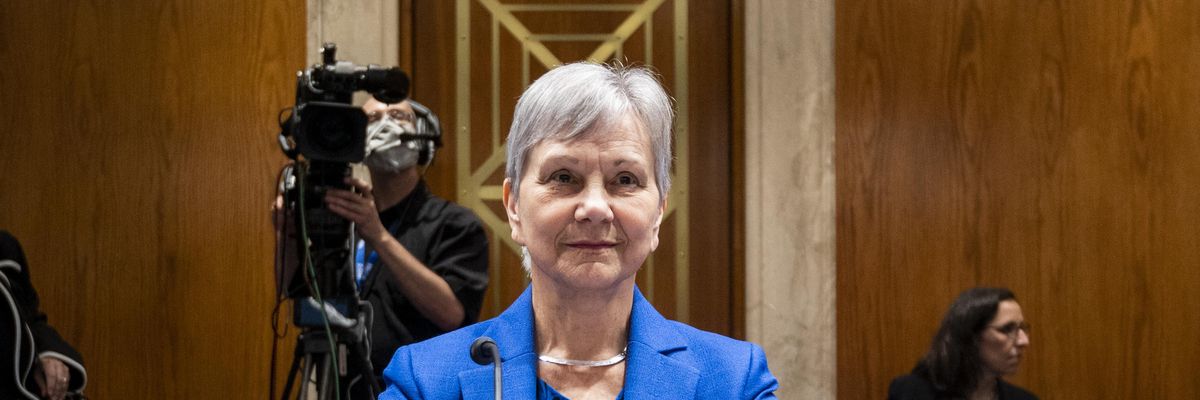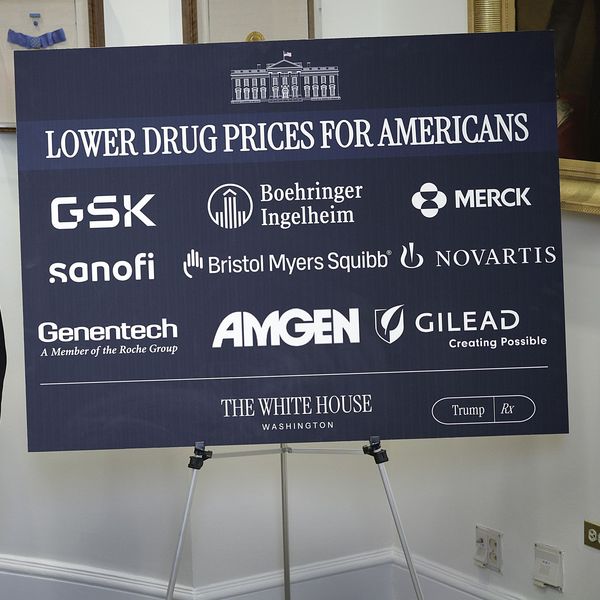
Dr. Janet Woodcock, acting commissioner of the Food and Drug Administration, prepares to testify during a Senate Appropriations Subcommittee hearing on June 10, 2021.(Photo: Bill Clark/CQ-Roll Call, Inc. via Getty Images)
Watchdog Demands FDA Chief Resign Over 'Reckless' Approval of Biogen Alzheimer's Drug
"This is legitimately one of the most irresponsible and egregious decisions in the history of the FDA. It needs to be a nationwide scandal."
A leading consumer advocacy group on Wednesday demanded the immediate resignation or removal of the acting head of the Food and Drug Administration as well as other U.S. government officials involved in the recent approval of Biogen's aducanumab, a purported Alzheimer's treatment whose effectiveness has been widely questioned by independent experts.
"This decision is a disastrous blow to the agency's credibility, public health, and the financial sustainability of the Medicare program."
--Dr. Michael Carome, Public Citizen
In a letter (pdf) to Health and Human Services Secretary Xavier Becerra, Public Citizen wrote that the FDA's decision to greenlight aducanumab--which will be priced at a staggering $56,000 a year--"ranks as one of the most irresponsible and egregious decisions in the history of the agency."
"The primary beneficiaries of the agency's action are Biogen and its shareholders, who undoubtedly are ecstatic about their soon-to-be-reaped windfall profits from sales of the company's exorbitantly priced but ineffective drug," reads the letter, authored by Public Citizen Health Research Group director Dr. Michael Carome. "The damage caused by the FDA's reckless approval of aducanumab to the agency's credibility as a science-based regulatory agency and to public health--and potentially to the financial sustainability of the Medicare program--cannot be overstated."
The FDA, currently led by Acting Commissioner Janet Woodcock, approved aducanumab last Monday despite the recommendation of the agency's independent advisory board, which refused to endorse the Alzheimer's treatment last year due to the lack of sufficient evidence demonstrating its effectiveness in slowing cognitive decline.
As Common Dreams reported last week, at least three members of the advisory panel have resigned in protest over the FDA's decision.
Dr. Aaron Kesselheim, a professor at Harvard Medical School, wrote in his resignation letter that the approval of aducanumab--which will be marketed under the brand name Aduhelm--was "probably the worst drug approval decision in recent U.S. history."
"At the last minute, the agency switched its review to the Accelerated Approval pathway based on the debatable premise that the drug's effect on brain amyloid was likely to help patients with Alzheimer's disease," Kesselheim added.
\u201cThis is legitimately one of the most irresponsible and egregious decisions in the history of the FDA. \n\nIt needs to be a nationwide scandal.\u201d— Public Citizen (@Public Citizen) 1623851948
In its letter on Wednesday, Public Citizen suggested that "the unprecedented, inappropriately close collaboration between the FDA and Biogen in the analysis of data from the key clinical trials of the drug" influenced the agency's final decision.
The watchdog group first raised alarm about the FDA and Biogen's partnership last December, alleging in a statement that the government agency and the pharmaceutical giant "jointly relied on dubious analyses that over-emphasized the results of one phase 3 trial suggesting the drug may work at a high dose, but disregarded data from the other phase 3 trial showing no benefit of the drug at any dose."
In addition to raising concerns about effectiveness and safety of aducanumab for Alzheimer's patients, Public Citizen also warned Wednesday that the FDA's approval of the drug "threatens to bankrupt the Medicare program because of the drug's exorbitant price (not to mention the additional costs of serial MRI scans that will be needed to monitor for the drug's adverse effects on the brain)."
"Approving aducanumab despite the lack of evidence of effectiveness has raised false hope for millions of Alzheimer's disease patients and their families," Carome wrote.
Carome went on to urge Becerra to "take immediate action to mitigate the damage caused by the FDA's approval of aducanumab to the agency's credibility as a science-based regulatory agency and to public health."
Specifically, Carome called on Becerra to request the resignations of or, if necessary, seek to remove Woodcock, Center for Drug Evaluation and Research (CDER) Director Patrizia Cavazzoni, and CDER's Office of Neuroscience Director Billy Dunn, three officials responsible for aducanumab's approval.
"The sheer recklessness of the FDA's approval of aducanumab cannot be overstated," Carome said in a statement. "This decision is a disastrous blow to the agency's credibility, public health, and the financial sustainability of the Medicare program."
As law professors Nicholas Bagley and Rachel Sachs wrote for The Atlantic last week, the FDA's decision to approve aducanumab "could trigger hundreds of billions of dollars of new government spending, all without a vote in Congress or indeed any public debate over the drug's value."
Under current law, Medicare is prohibited from negotiating drug prices with manufacturers, meaning the federal government will pay Biogen's $56,000 annual per-patient price for the drug. Amid howls of outrage over the medication's price tag, Biogen CEO Michel Vounatsos insisted Monday that the cost is "fair" and promised not to raise it for four years.
Bagley and Sachs noted that "if even one-third of the estimated 6 million people with Alzheimer's in the United States receives the new treatment, [federal] healthcare spending could swell by $112 billion annually."
"To put that figure in perspective, in 2020, Medicare spent about $90 billion on prescription drugs for 46 million Americans through the Part D program, which covers prescription medication that you pick up at your local pharmacy," the pair wrote. "We could wind up spending more than that for Aduhelm alone."
An Urgent Message From Our Co-Founder
Dear Common Dreams reader, The U.S. is on a fast track to authoritarianism like nothing I've ever seen. Meanwhile, corporate news outlets are utterly capitulating to Trump, twisting their coverage to avoid drawing his ire while lining up to stuff cash in his pockets. That's why I believe that Common Dreams is doing the best and most consequential reporting that we've ever done. Our small but mighty team is a progressive reporting powerhouse, covering the news every day that the corporate media never will. Our mission has always been simple: To inform. To inspire. And to ignite change for the common good. Now here's the key piece that I want all our readers to understand: None of this would be possible without your financial support. That's not just some fundraising cliche. It's the absolute and literal truth. We don't accept corporate advertising and never will. We don't have a paywall because we don't think people should be blocked from critical news based on their ability to pay. Everything we do is funded by the donations of readers like you. Will you donate now to help power the nonprofit, independent reporting of Common Dreams? Thank you for being a vital member of our community. Together, we can keep independent journalism alive when it’s needed most. - Craig Brown, Co-founder |
A leading consumer advocacy group on Wednesday demanded the immediate resignation or removal of the acting head of the Food and Drug Administration as well as other U.S. government officials involved in the recent approval of Biogen's aducanumab, a purported Alzheimer's treatment whose effectiveness has been widely questioned by independent experts.
"This decision is a disastrous blow to the agency's credibility, public health, and the financial sustainability of the Medicare program."
--Dr. Michael Carome, Public Citizen
In a letter (pdf) to Health and Human Services Secretary Xavier Becerra, Public Citizen wrote that the FDA's decision to greenlight aducanumab--which will be priced at a staggering $56,000 a year--"ranks as one of the most irresponsible and egregious decisions in the history of the agency."
"The primary beneficiaries of the agency's action are Biogen and its shareholders, who undoubtedly are ecstatic about their soon-to-be-reaped windfall profits from sales of the company's exorbitantly priced but ineffective drug," reads the letter, authored by Public Citizen Health Research Group director Dr. Michael Carome. "The damage caused by the FDA's reckless approval of aducanumab to the agency's credibility as a science-based regulatory agency and to public health--and potentially to the financial sustainability of the Medicare program--cannot be overstated."
The FDA, currently led by Acting Commissioner Janet Woodcock, approved aducanumab last Monday despite the recommendation of the agency's independent advisory board, which refused to endorse the Alzheimer's treatment last year due to the lack of sufficient evidence demonstrating its effectiveness in slowing cognitive decline.
As Common Dreams reported last week, at least three members of the advisory panel have resigned in protest over the FDA's decision.
Dr. Aaron Kesselheim, a professor at Harvard Medical School, wrote in his resignation letter that the approval of aducanumab--which will be marketed under the brand name Aduhelm--was "probably the worst drug approval decision in recent U.S. history."
"At the last minute, the agency switched its review to the Accelerated Approval pathway based on the debatable premise that the drug's effect on brain amyloid was likely to help patients with Alzheimer's disease," Kesselheim added.
\u201cThis is legitimately one of the most irresponsible and egregious decisions in the history of the FDA. \n\nIt needs to be a nationwide scandal.\u201d— Public Citizen (@Public Citizen) 1623851948
In its letter on Wednesday, Public Citizen suggested that "the unprecedented, inappropriately close collaboration between the FDA and Biogen in the analysis of data from the key clinical trials of the drug" influenced the agency's final decision.
The watchdog group first raised alarm about the FDA and Biogen's partnership last December, alleging in a statement that the government agency and the pharmaceutical giant "jointly relied on dubious analyses that over-emphasized the results of one phase 3 trial suggesting the drug may work at a high dose, but disregarded data from the other phase 3 trial showing no benefit of the drug at any dose."
In addition to raising concerns about effectiveness and safety of aducanumab for Alzheimer's patients, Public Citizen also warned Wednesday that the FDA's approval of the drug "threatens to bankrupt the Medicare program because of the drug's exorbitant price (not to mention the additional costs of serial MRI scans that will be needed to monitor for the drug's adverse effects on the brain)."
"Approving aducanumab despite the lack of evidence of effectiveness has raised false hope for millions of Alzheimer's disease patients and their families," Carome wrote.
Carome went on to urge Becerra to "take immediate action to mitigate the damage caused by the FDA's approval of aducanumab to the agency's credibility as a science-based regulatory agency and to public health."
Specifically, Carome called on Becerra to request the resignations of or, if necessary, seek to remove Woodcock, Center for Drug Evaluation and Research (CDER) Director Patrizia Cavazzoni, and CDER's Office of Neuroscience Director Billy Dunn, three officials responsible for aducanumab's approval.
"The sheer recklessness of the FDA's approval of aducanumab cannot be overstated," Carome said in a statement. "This decision is a disastrous blow to the agency's credibility, public health, and the financial sustainability of the Medicare program."
As law professors Nicholas Bagley and Rachel Sachs wrote for The Atlantic last week, the FDA's decision to approve aducanumab "could trigger hundreds of billions of dollars of new government spending, all without a vote in Congress or indeed any public debate over the drug's value."
Under current law, Medicare is prohibited from negotiating drug prices with manufacturers, meaning the federal government will pay Biogen's $56,000 annual per-patient price for the drug. Amid howls of outrage over the medication's price tag, Biogen CEO Michel Vounatsos insisted Monday that the cost is "fair" and promised not to raise it for four years.
Bagley and Sachs noted that "if even one-third of the estimated 6 million people with Alzheimer's in the United States receives the new treatment, [federal] healthcare spending could swell by $112 billion annually."
"To put that figure in perspective, in 2020, Medicare spent about $90 billion on prescription drugs for 46 million Americans through the Part D program, which covers prescription medication that you pick up at your local pharmacy," the pair wrote. "We could wind up spending more than that for Aduhelm alone."
A leading consumer advocacy group on Wednesday demanded the immediate resignation or removal of the acting head of the Food and Drug Administration as well as other U.S. government officials involved in the recent approval of Biogen's aducanumab, a purported Alzheimer's treatment whose effectiveness has been widely questioned by independent experts.
"This decision is a disastrous blow to the agency's credibility, public health, and the financial sustainability of the Medicare program."
--Dr. Michael Carome, Public Citizen
In a letter (pdf) to Health and Human Services Secretary Xavier Becerra, Public Citizen wrote that the FDA's decision to greenlight aducanumab--which will be priced at a staggering $56,000 a year--"ranks as one of the most irresponsible and egregious decisions in the history of the agency."
"The primary beneficiaries of the agency's action are Biogen and its shareholders, who undoubtedly are ecstatic about their soon-to-be-reaped windfall profits from sales of the company's exorbitantly priced but ineffective drug," reads the letter, authored by Public Citizen Health Research Group director Dr. Michael Carome. "The damage caused by the FDA's reckless approval of aducanumab to the agency's credibility as a science-based regulatory agency and to public health--and potentially to the financial sustainability of the Medicare program--cannot be overstated."
The FDA, currently led by Acting Commissioner Janet Woodcock, approved aducanumab last Monday despite the recommendation of the agency's independent advisory board, which refused to endorse the Alzheimer's treatment last year due to the lack of sufficient evidence demonstrating its effectiveness in slowing cognitive decline.
As Common Dreams reported last week, at least three members of the advisory panel have resigned in protest over the FDA's decision.
Dr. Aaron Kesselheim, a professor at Harvard Medical School, wrote in his resignation letter that the approval of aducanumab--which will be marketed under the brand name Aduhelm--was "probably the worst drug approval decision in recent U.S. history."
"At the last minute, the agency switched its review to the Accelerated Approval pathway based on the debatable premise that the drug's effect on brain amyloid was likely to help patients with Alzheimer's disease," Kesselheim added.
\u201cThis is legitimately one of the most irresponsible and egregious decisions in the history of the FDA. \n\nIt needs to be a nationwide scandal.\u201d— Public Citizen (@Public Citizen) 1623851948
In its letter on Wednesday, Public Citizen suggested that "the unprecedented, inappropriately close collaboration between the FDA and Biogen in the analysis of data from the key clinical trials of the drug" influenced the agency's final decision.
The watchdog group first raised alarm about the FDA and Biogen's partnership last December, alleging in a statement that the government agency and the pharmaceutical giant "jointly relied on dubious analyses that over-emphasized the results of one phase 3 trial suggesting the drug may work at a high dose, but disregarded data from the other phase 3 trial showing no benefit of the drug at any dose."
In addition to raising concerns about effectiveness and safety of aducanumab for Alzheimer's patients, Public Citizen also warned Wednesday that the FDA's approval of the drug "threatens to bankrupt the Medicare program because of the drug's exorbitant price (not to mention the additional costs of serial MRI scans that will be needed to monitor for the drug's adverse effects on the brain)."
"Approving aducanumab despite the lack of evidence of effectiveness has raised false hope for millions of Alzheimer's disease patients and their families," Carome wrote.
Carome went on to urge Becerra to "take immediate action to mitigate the damage caused by the FDA's approval of aducanumab to the agency's credibility as a science-based regulatory agency and to public health."
Specifically, Carome called on Becerra to request the resignations of or, if necessary, seek to remove Woodcock, Center for Drug Evaluation and Research (CDER) Director Patrizia Cavazzoni, and CDER's Office of Neuroscience Director Billy Dunn, three officials responsible for aducanumab's approval.
"The sheer recklessness of the FDA's approval of aducanumab cannot be overstated," Carome said in a statement. "This decision is a disastrous blow to the agency's credibility, public health, and the financial sustainability of the Medicare program."
As law professors Nicholas Bagley and Rachel Sachs wrote for The Atlantic last week, the FDA's decision to approve aducanumab "could trigger hundreds of billions of dollars of new government spending, all without a vote in Congress or indeed any public debate over the drug's value."
Under current law, Medicare is prohibited from negotiating drug prices with manufacturers, meaning the federal government will pay Biogen's $56,000 annual per-patient price for the drug. Amid howls of outrage over the medication's price tag, Biogen CEO Michel Vounatsos insisted Monday that the cost is "fair" and promised not to raise it for four years.
Bagley and Sachs noted that "if even one-third of the estimated 6 million people with Alzheimer's in the United States receives the new treatment, [federal] healthcare spending could swell by $112 billion annually."
"To put that figure in perspective, in 2020, Medicare spent about $90 billion on prescription drugs for 46 million Americans through the Part D program, which covers prescription medication that you pick up at your local pharmacy," the pair wrote. "We could wind up spending more than that for Aduhelm alone."

